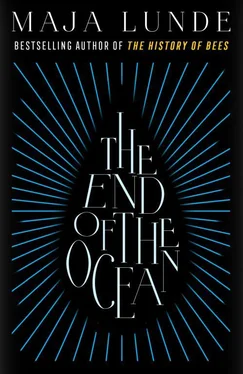I stand there in the cockpit, a soft wind caressing my cheeks; the ocean is growing calm, the sun breaks through the clouds, the water on deck evaporates, and the floor is slippery. When the ocean is peaceful, mirroring the sky like this, I could be anywhere on earth—nothing about the ocean here, about the sky, tells me that I’m located on the North Sea. The surface is identical, here and in the Pacific Ocean, an ocean is an ocean is an ocean, until you go beneath the surface. It is then that you will see the species, the seabed, hollows and seamounts that make every ocean unique, the way mountain formations and animal life on land create the variations and characteristics of different regions. The surface of the ocean is the sky for the underwater world, above high mountains and deep valleys, for thousands of creatures we have never seen.
I tear myself away, walk on deck, over to the mast, put my feet on the mast rungs and climb upwards, two thirds of the way up. It’s easy to loosen the halyard from the crosstree; I look down, the deck is small below me, just water everywhere, the horizon, the sky and the only thing I have is this boat.
Blue , my Blue , I think immediately, you saved me when I couldn’t save myself, you took over when I couldn’t take any more. But then I shake it off, snort to myself. How sentimental, it’s just a boat, just aluminum, plastic and fiberglass, wood and ropes. I am the skipper, this is a skilled profession. I would never have managed had it not been for an entire lifetime of experience.
I climb down again and go inside; everything is in disarray, cupboards and drawers I thought I’d secured have opened, knives and forks have been thrown across the floor. I have to clean up, but first I must check my position. I have no power, the fuse box may have short-circuited, I should trouble-shoot, but can’t bring myself to do it. I hate the small shocks I sometimes get and perhaps it will dry out on its own. I must bank on that, have experienced it before, I just have to wait, until the sun and the air do their job, once again prevail over the water.
Map, pen, paper and sextant, I bring all of it up into the cockpit, look at the clock, exactly 13:06 hours, check the tables, gauge the position of the sun, find the degree of longitude. I know how to do this too—I am clever, I think, I am clever, there’s nothing wrong with telling myself that I’m clever.
But it takes time, good God, what painstaking work, it’s been a long time since I have used these ancient methods, but finally I establish the degree of latitude and a position.
I sit there looking at the “X” I drew on the nautical map—there’s the boat, there I am.
And now I understand where the wind has taken me, that in the course of the storm it changed directions, came from the north, and it has helped me, carried me south. I’m already at the same latitude as Flekkefjord. Thank you, wind, thank you, ocean, thank you, weather. Again I can raise the sail, I can move on, set my course for the English Channel.
Lou chewed and swallowed. It was the most beautiful thing I’d ever seen.
She chewed quickly and swallowed even more quickly. Couldn’t get enough. We were sitting in the mess hall. For the first time she was strong enough to accompany me here. She woke up bright and early because she was hungry and we had made it here before the rush. The tables and benches around us were still empty and the temperature was tolerable.
“Is there any more?” she asked when the dish was empty.
She’d had most of my bread, too.
“I’ll go ask,” I said.
Even though I knew this was all we would get.
At that moment Francis came over. He must have heard our conversation, because now he handed her another piece of bread and sat down with us.
“Thank you,” I said, because Lou was too busy eating.
*
“Come on, let’s go,” I said when she was finally finished.
“Where?”
“To the Red Cross.”
She stretched out her feet in front of her, looked at them and not at me. “I don’t need to.”
“Yes. You need to. We haven’t been there in four days.”
“There’s just a long line, nothing else.”
“She can stay with me,” Francis said.
“Yes, I can,” Lou said. “I can stay with Francis.”
“No,” I said. “You have to come with me. Imagine if they’ve arrived.”
“They haven’t,” Lou said. “You heard what the lady said. They’ll let us know if Mommy comes.”
“We’re going now,” I said.
“No,” she said and lifted her head.
She stared at me, eyes shining.
She was really well again. I had nothing to offer in response to that no.
So I went. Alone. Angry and pleased at the same time.
I couldn’t remember the last time I was alone, just walking like this, without holding Lou’s hand. I opened and closed my fingers.
I was able to breathe again. She was fine. I had managed it. Taken care of her, brought her through the crisis. Without Anna.
Without Anna. My heart started pounding even harder.
Today, today they’ve learned something, today they’ve made contact. Found them. Today Jeanette will have good news.
But when I entered the barracks, it wasn’t Jeanette who was sitting behind the desk. It was a man I’d never seen before.
He didn’t even look up.
“There’s nothing new here,” he said to the screen.
“But you don’t know who I’m looking for.”
“There’s been no contact with anyone since yesterday and no new arrivals have registered. You’ll have to wait for a few days.”
“But many days have passed since the last time I was here. Where is the woman who’s usually here, Jeanette? She knows my case.”
“She left,” he said. “Replaced.”
“Why is that?”
He didn’t reply, taking a cookie from a can under the desk instead.
“Sorry,” he said as he crunched away. “Need something to keep me going. Half rations for us as well.”
I walked outside again. By the entrance there was an overflowing garbage can. It stunk in the heat. I turned around. A wire supporting the tent in front of me had come loose, the canvas was hanging askew. And a little further down along the row someone had painted slogans on a barracks wall. Portuguese? Spanish? I didn’t understand the language, but the letters spoke to me anyway, the way they were painted, jagged, brash, hot-tempered.
The lack of toilet paper. The first-aid clinic that was closed. Jeanette’s disappearance. I had seen it, but hadn’t really given it much thought before now. I continued walking aimlessly between the barracks. I had to get back to Lou, but couldn’t manage it, saw only how many things were not as they should be. People were dirtier, thinner, there was garbage everywhere.
As I wandered around, my heart pounded harder and harder.
Lou was well, I had managed that. But we were still half a family. I was still bloody well alone. And now the camp was falling apart.
It makes no difference what I do, I thought suddenly.
Nothing makes any difference.
I can fight for my life. I can fight for her. But it makes no difference when there’s no longer anywhere to live.
All of a sudden I heard loud, angry voices.
I changed direction, drawn towards them.
Around the corner of Hall 2.
There, in the blistering heat, stood the man from the line, Thick-Neck, crowding another man, almost on top of him. It was Martin. Both were shouting, screaming, red in the face like cartoon characters. But there was nothing to laugh about here.
At that moment Caleb and Christian came walking by. They stopped for a moment when they spotted Thick-Neck, before they flew at him.
Читать дальше










